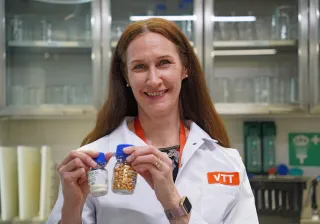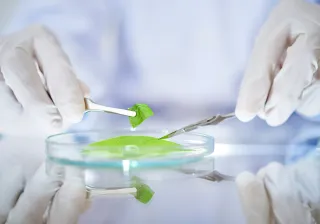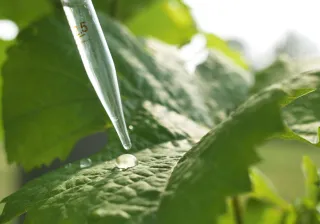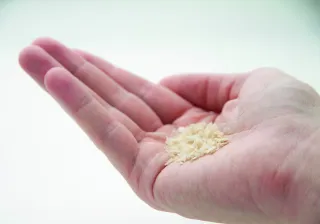VTT is participating in two projects under the US National Science Foundation's (NSF) Global Centers program, which aim to solve global challenges, especially through bioeconomy. Finland is the only EU country selected for the program. In these projects, top research organisations from five countries develop solutions that support a climate-neutral future.
The extensive Global Centers program led by the US National Science Foundation opened for Finland in 2024 for the first time. VTT Technical Research Centre of Finland is included in one of the six international consortia that received NSF Global Center status in the application process. In addition, several international proof-of-concept (poc) projects were launched as part of the program. VTT plays an important role in the mutually supportive Biofoundry Global Center and the FoodID poc projects linked by bioeconomy and the use of biotechnology in producing both materials and food.
“Getting involved in these future-changing, international breakthrough projects is a great honour and a valuable recognition for our cutting-edge bioeconomy research, where we are at the top of the world. Our role is to bring Finnish industrial biotechnology and bioprocess expertise and technology to the program. VTT's ability to scale technology from the laboratory to a pilot environment is a valuable advantage enabling us to develop the industrialisation of bioprocesses,” says Tua Huomo, Executive Vice President of VTT's sustainable products and materials business area.
The total budget of VTT's projects will rise to almost 20 million euros. Business Finland and the Research Council of Finland have granted approximately 13 million euros in funding.
"We are proud that two consortia from Finland funded by Business Finland and led by VTT have been selected for the Global Centers program. Long-term research and development funding plays a crucial role in such forward-looking projects, which are expected to yield breakthrough solutions for international markets only after several years," says Executive Director Timo Metsä-Tokila from Business Finland.
Aalto University, the University of Helsinki, and ten companies also contribute with their own research to the projects coordinated by VTT.
“Finland's participation in the NSF Global Centers program is a significant concrete step for increasing scientific and technological cooperation with the United States. VTT's cooperation with NSF and other international actors strengthens the position of Finnish organisations as pioneers of bioeconomy. The goals of the Global Centers projects also support the European Union's climate goals and global efforts towards carbon neutrality,” says Undersecretary of State at the Ministry of Economic Affairs and Employment Petri Peltonen, who has served as the Finnish chairman of the US-Finnish Science and Technology Committee.
Biotechnology to produce materials and food that support sustainable development
The Biofoundry project focuses on the development and utilisation of new types of biological production processes based on microbes on an industrial scale. The goal is to enable the replacement of particularly fossil-based materials with bio-based materials.
“In the long term, biofoundries will revolutionise bioeconomy, as materials can be produced from various resources, such as biomass and carbon dioxide. In the project, VTT develops the equipment, processes, microbial strains and data processing required by bioproduction in such a way that in the future, bioproduction will work like any other production,” says Tiina Nakari-Setälä, VTT's Vice President of industrial biotechnology and food.
The Biofoundry project, which starts in early 2025 and lasts until the end of 2029, also includes research institutes and universities from South Korea, Japan, Great Britain and the United States. The University of Illinois Urbana-Champaign coordinates the collaboration.
Biotechnology also strongly supports the FoodID project. The goal is to accelerate the transition of the food system in a direction that reduces the environmental burden caused particularly by meat production by combining cellular agriculture, including fermentation, and plant-based innovations. FoodID focuses especially on improving the sensory and nutritional quality of alternative foods. The three-year project is implemented as a collaboration between the United States and Finland coordinated by the University of Nebraska-Lincoln.
Further information:
Tiina Nakari-Setälä, vice president, industrial biotechnology and food,
tel. +358 40 821 5794, email: tiina.nakari-setala (at) vtt.fi
Ilmari Absetz, Chief Funding Advisor, Business Finland,
tel. +358 50 557 7837, email: ilmari.absetz (at) businessfinland.fi








